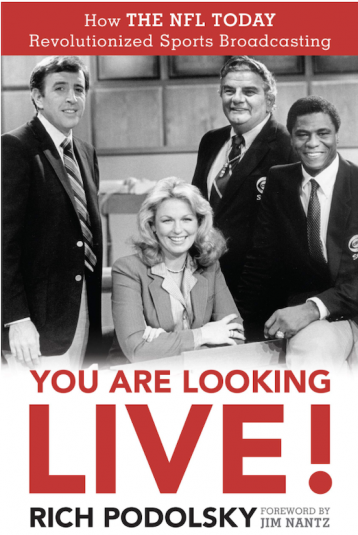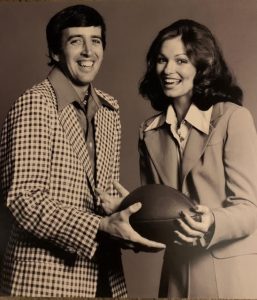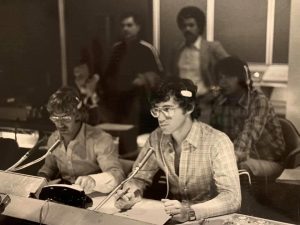New Book Looks Back at How The NFL Today on CBS Changed Sports Broadcasting
Nine Sports Broadcasting Hall of Famers have been connected to the show
Story Highlights
It isn’t very often that a book comes out that is chock full of members of the Sports Broadcasting Hall of Fame (and plenty of others in our industry), but that is the case with Rich Podolsky’s You Are Looking Live!: How The NFL Today Revolutionized Sports Broadcasting, which hits shelves next week. Podolsky, who was a writer on the show and worked at CBS Sports from 1977 to 1982, points out the strong connection between the show and the Sports Broadcasting Hall of Fame: nine members have been connected to the show.
 “I have a section in the book called The NFL Today Hall of Fame, where I list nine people who are in the Sports Broadcasting Hall of Fame who worked on the show,” says Podolsky. (The book can be preordered at Amazon here).
“I have a section in the book called The NFL Today Hall of Fame, where I list nine people who are in the Sports Broadcasting Hall of Fame who worked on the show,” says Podolsky. (The book can be preordered at Amazon here).
Those Hall of Famers are James Brown, Bob Fishman, Bill Fitts, Phyllis George, Brent Musberger, Jim Nantz, Mike Pearl, Lesley Visser, and Jack Whitaker.
It was the death of Phyllis George that sparked Podolsky’s efforts to tackle the project.
The story offers plenty of anecdotes from an era of sports broadcasting that most likely will never return. It was an era of big budgets, big ratings, and, of course, social and professional behavior that today would be considered questionable. But it was also an era when a TV show like The NFL Today could change society.
“In the first year, the show became so popular that people rearranged their church-going schedules to be home,” says Podolsky. “And the show won 13 Emmys its first year, which is unheard of.”

Brent Musburger and Phyllis George made The NFL Today on CBS must-watch viewing on Sunday afternoons.
The book traces the history of the show, beginning with its first season in 1974, when Whitaker was host along with Lee Leonard. But after one season CBS changed the cast and also the history of sports television when Musburger, Irv Cross, and George took to the airwaves.
“They all rehearsed for several weeks together, got to know each other, and do a lot of things together,” says Podolsky. “Brent became really great at handoffs, leading in and out of things, and letting other people take some of the spotlight.”
The show was an immediate hit because it was not only all live but also had extraordinary talent. Musburger was considered a magic man who helped the WBM Chicago evening newscast make the leap to No. 1, and George was the first woman co-host on a sports program and was known not only for being Miss America but also for her work on Candid Camera. Cross added the former-player element and also had experience as an analyst for CBS in Philadelphia. There was plenty of debate between the hosts, but each co-host brought a unique skill set to the table. Musburger, for example, quickly became an expert at bouncing from game to game and highlight to highlight during halftime.
“Videotape was a little more than a decade old,” says Podolsky, “and, in the early-game window, there were eight or nine games. When Brent came in, he was like a kid in a candy store.”
Cross, meanwhile, provided insights into coaching and strategy and had a knack for getting information out of coaches and players that only an ex-player could get. And George was an expert at first-class interviews, thanks to a style that made players comfortable and relaxed.
The book offers plenty of great anecdotes not only about the people involved but about the evolving relationship between the NFL and the TV networks. And, of course, there is the story about how Musburger’s famous opening line for the show, “You’re looking live,” came to be.

Bob Fishman directing The NFL Today.
“At one of the first production meetings in 1975,” Podolsky explains, “the show’s director, Bob Fishman, said he had some buddies who like to bet on games and they always wanted to know the weather. When the show opened with stadium shots, Brent said he could start off by saying ‘You are looking live at Soldier Field in Chicago, and then you are looking live at Vet Stadium in Philadelphia.’ When Brent said it in the production meeting, it was like everybody had seen the Mona Lisa for the first time: it was perfect. And it became the opening line for the next 15 years.”
The NFL Today’s impact is still felt today: a live pregame is part of nearly every sports event.
“Before The NFL Today, nothing was live except for the games,” says Podolsky. “The local stations were probably pretty happy to have 30 minutes leading into the games because the games were doing well for them ratings-wise. And CBS also had the best markets back then.”
The book includes lots of fascinating insights and stories, including the story of Marjorie Margolies, who was the first woman to work on an NFL pregame show.
She left after the first season, going on to win five Emmys for the Today show in Washington, DC, and also becoming a U.S. representative for Pennsylvania.
The book also offers some great stories about how Jimmy “The Greek” became a TV sensation thanks to Mike Pearl, who brought him onto the show in 1976.
“NFL Commissioner Pete Rozelle didn’t want anyone to talk about point spreads,” says Podolsky, “so The Greek had to get around it by saying, ‘I think the team will win by a field goal or a touchdown.’ But Rozelle also told friends at CBS privately that he knew The Greek would bring more eyeballs to the games. What The NFL Today was doing by becoming so popular was changing the way America watched the NFL. It helped the NFL overtake baseball as America’s favorite sport.”

Phyllis George could leave a lasting impression on those she met, including Podolsky’s mother, Rose, who received this autographed picture after knitting a sweater for George’s son Lincoln.
Of all the people on the show, Podolsky had a particular warm spot in his heart for George.
“A lot of us who knew her on The NFL Today were deeply saddened [by her death],” he says. “She was terrific, wonderful to work with, and just a great person. For example, the first Thanksgiving I worked on the show, my mother came as she was a recent widow, and she sat in the corner knitting while the games were going on. Phyllis, instead of going back to her dressing room, sat down with her and talked knitting for 30 minutes. That’s the type of person she was.”
